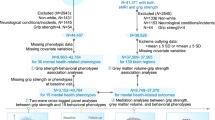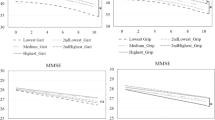Abstract
Background
Subjective memory complaints are considered an early sign of cognitive decline. Recent evidence shows that grip strength is an important predictor of cognitive function. However, few studies have compared whether one condition is uniquely associated with cognitive function when another condition is controlled for.
Aims
To explore the longitudinal associations of cognitive function with subjective memory complaints and grip strength in middle-aged and older adults, with a particular focus on whether one condition is uniquely associated with cognitive function when another condition is considered.
Methods
A total of 3,877 middle-aged and older adults (aged 45–92 years) from the China Health and Retirement Longitudinal Study reported on their demographic and health status and completed measures of grip strength and subjective memory complaints, as well as a series of cognitive tests, every two years between 2011 and 2015. Generalized estimating equation models were used to assess the relationships between grip strength, subjective memory complaints, and cognitive function.
Results
Grip strength was longitudinally associated with cognitive function (β = 0.021, 95% confidence interval [CI]: 0.011, 0.030, P < 0.001) independent of subjective memory complaints. In contrast, changes in the subjective memory complaints were not related to cognitive function over time (β = 0.107, 95% CI: − 0.025, 0.238, P = 0.112). Only at baseline subjective memory complaints were associated with poorer cognitive function (β = − 1.142, 95% CI: − 1.309, − 0.975, P < 0.001).
Conclusions
Grip strength might be a more important clinical correlate of cognitive function decline over time than subjective memory complaints.
Discussion
Regular assessment and close monitoring of grip strength might help identify individuals who might be at high risk for cognitive impairment.
Similar content being viewed by others
Availability of data and materials
The data were unidentified and publicly available, and institutional review board approval was not applicable.
References
Organization WH (2022) Ageing and health. WHO. https://www.who.int/zh/news-room/fact-sheets/detail/ageing-and-health. Accessed 3 April 2023.
Luo ZZ, Lv Q (2021) National Bureau of Statistics: 18.7% of the population aged 60 or above is aging. People Web. http://finance.people.com.cn/n1/2021/0511/c1004-32100026.html. Accessed 3 April 2023.
Fang EF, Xie C, Schenkel JA et al (2020) A research agenda for ageing in China in the 21st century (2nd edition): Focusing on basic and translational research, long-term care, policy and social networks. Ageing Res Rev 64:101174. https://doi.org/10.1016/j.arr.2020.101174
Yuan L, Zhang X, Guo N et al (2021) Prevalence of cognitive impairment in Chinese older inpatients and its relationship with 1-year adverse health outcomes: a multi-center cohort study. BMC Geriatr 21:595. https://doi.org/10.1186/s12877-021-02556-5
Tochel C, Smith M, Baldwin H et al (2019) What outcomes are important to patients with mild cognitive impairment or Alzheimer’s disease, their caregivers, and health-care professionals? A systematic review. Alzheimers Dement (Amst) 11:231–247. https://doi.org/10.1016/j.dadm.2018.12.003
Jia L, Du Y, Chu L et al (2020) Prevalence, risk factors, and management of dementia and mild cognitive impairment in adults aged 60 years or older in China: a cross-sectional study. Lancet Public Health 5:e661–e671. https://doi.org/10.1016/S2468-2667(20)30185-7
Reisberg B, Gauthier S (2008) Current evidence for subjective cognitive impairment (SCI) as the pre-mild cognitive impairment (MCI) stage of subsequently manifest Alzheimer’s disease. Int Psychogeriatr 20:1–16. https://doi.org/10.1017/S1041610207006412
Jessen F, Amariglio RE, van Boxtel M et al (2014) A conceptual framework for research on subjective cognitive decline in preclinical Alzheimer’s disease. Alzheimers Dement 10:844–852. https://doi.org/10.1016/j.jalz.2014.01.001
Steinberg SI, Negash S, Sammel MD et al (2013) Subjective memory complaints, cognitive performance, and psychological factors in healthy older adults. Am J Alzheimers Dis Other Demen 28:776–783. https://doi.org/10.1177/1533317513504817
Zou Y, Song N, Hu YB (2017) Caregivers’ attitude toward disclosure of Alzheimer’s disease diagnosis in Urban China. International Psychogeriatrics 29:1849–1855. https://doi.org/10.1017/S1041610217001132
Kundhal KK, Kundhal PS, MSJAMA (2003) Cultural diversity: an evolving challenge to physician-patient communication. JAMA 289:94. https://doi.org/10.1001/jama.289.1.94
Yeung A, Chang D, Gresham RL et al (2004) Illness beliefs of depressed Chinese American patients in primary care. J Nerv Ment Dis 192:324–327. https://doi.org/10.1097/01.nmd.0000120892.96624.00
Norton DJ, Amariglio R, Protas H (2017) Subjective memory complaints in preclinical autosomal dominant Alzheimer disease. Neurology 89:1464–1470. https://doi.org/10.1212/WNL.0000000000004533
Sabatini S, Woods RT, Ukoumunne OC et al (2022) Associations of subjective cognitive and memory decline with depression, anxiety, and two-year change in objectively-assessed global cognition and memory. Neuropsychol Dev Cogn B Aging Neuropsychol Cogn 29:840–866. https://doi.org/10.1080/13825585.2021.1923634
Saykin AJ, Wishart HA, Rabin LA et al (2006) Older adults with cognitive complaints show brain atrophy similar to that of amnestic MCI. Neurology 67:834–842. https://doi.org/10.1212/01.wnl.0000234032.77541.a2
Reeve TE 4th, Ur R, Craven TE et al (2018) Grip strength measurement for frailty assessment in patients with vascular disease and associations with comorbidity, cardiac risk, and sarcopenia. J Vasc Surg 67:1512–1520. https://doi.org/10.1016/j.jvs.2017.08.078
Peng TC, Chiou JM, Chen TF et al (2022) Grip strength and sarcopenia predict 2-year cognitive impairment in community-dwelling older adult. J Am Med Dir Assoc S1525–8610:00803–00809. https://doi.org/10.1016/j.jamda.2022.10.015
Carson RG (2018) Get a grip: individual variations in grip strength are a marker of brain health. Neurobiol Aging 71:189–222. https://doi.org/10.1016/j.neurobiolaging.2018.07.023
Arshavsky YI (2003) Cellular and network properties in the functioning of the nervous system: from central pattern generators to cognition. Brain Res Brain Res Rev 41:229–267. https://doi.org/10.1016/s0165-0173(02)00249-7
Li W, Luo Z, Jiang J et al (2023) The effects of exercise intervention on cognition and motor function in stroke survivors: a systematic review and meta-analysis. Neurol Sci. https://doi.org/10.1007/s10072-023-06636-9
Fritz NE, McCarthy CJ, Adamo DE (2017) Handgrip strength as a means of monitoring progression of cognitive decline–a scoping review. Ageing Res Rev 35:112–123. https://doi.org/10.1016/j.arr.2017.01.004
Zammit AR, Robitaille A, Piccinin AM et al (2019) Associations between aging-related changes in grip strength and cognitive function in older adults: a systematic review. J Gerontol A Biol Sci Med Sci 74:519–527. https://doi.org/10.1093/gerona/gly046
Singh-Manoux A, Kivimaki M, Glymour MM et al (2012) Timing of onset of cognitive decline: results from Whitehall II prospective cohort study. BMJ. 344:d7622. https://doi.org/10.1136/bmj.d7622
Zhao Y, Hu Y, Smith JP et al (2014) Cohort profile: the China health and retirement longitudinal study (CHARLS). Int J Epidemiol 43:61–68. https://doi.org/10.1093/ije/dys203
Xu W, Bai A, Liang Y et al (2022) Association between depression and motoric cognitive risk syndrome among community-dwelling older adults in China: a 4-year prospective cohort study. Eur J Neurol 29:1377–1384. https://doi.org/10.1111/ene.15262
Meng Q, Wang H, Strauss J et al (2019) Validation of neuropsychological tests for the China health and retirement longitudinal study harmonized cognitive assessment protocol. Int Psychogeriatr 31:1709–1719. https://doi.org/10.1017/S1041610219000693
Lin L, Cao B, Chen W et al (2022) Association of adverse childhood experiences and social isolation with later-life cognitive function among adults in China. JAMA Netw Open. 5:e2241714. https://doi.org/10.1001/jamanetworkopen.2022.41714
Zeger SL, Liang KY, Albert PS (1988) Models for longitudinal data: a generalized estimating equation approach. Biometrics 44:1049–1060
Lipsitz SR, Fitzmaurice G, Orav EJ et al (1994) Performance of generalized estimating equations in practical situations. Biometrics 50:270–278
McGrath R, Robinson-Lane SG, Cook S et al (2019) Handgrip strength is associated with poorer cognitive functioning in aging Americans. J Alzheimers Dis 70:1187–1196. https://doi.org/10.3233/JAD-190042
Jiang R, Westwater ML, Noble S et al (2022) Associations between grip strength, brain structure, and mental health in > 40,000 participants from the UK Biobank. BMC Med 20:286. https://doi.org/10.1186/s12916-022-02490-2
Wan K, Yin W, Tang Y et al (2023) Brain gray matter volume mediated the correlation between plasma p-tau and cognitive function of early alzheimer’s disease in China: a cross-sectional observational study. J Alzheimers Dis 92:81–93. https://doi.org/10.3233/JAD-221100
Zimmerman ME, Brickman AM, Paul RH et al (2006) The relationship between frontal gray matter volume and cognition varies across the healthy adult lifespan. Am J Geriatr Psychiatry 14:823–833. https://doi.org/10.1097/01.JGP.0000238502.40963.ac
Dercon Q, Nicholas JM, James SN et al (2021) Grip strength from midlife as an indicator of later-life brain health and cognition: evidence from a British birth cohort. BMC Geriatr 21:475. https://doi.org/10.1186/s12877-021-02411-7
Richardson JK, Ellmers TJ (2022) The relationship between clinical measures of cognitive function and grip strength in healthy older adults. BMC Geriatr 22:907. https://doi.org/10.1186/s12877-022-03629-9
McGrath RP (2019) Understanding the feasibility and validity of muscle strength measurements in aging adults. J Am Med Dir Assoc 20:99–100. https://doi.org/10.1016/j.jam-da.2018.07.011
Shang X, Meng X, Xiao X et al (2021) Grip training improves handgrip strength, cognition, and brain white matter in minor acute ischemic stroke patients. Clin Neurol Neurosurg. 209:106886. https://doi.org/10.1016/j.clineuro.2021.106886
Mitchell AJ, Beaumont H, Ferguson D et al (2014) Risk of dementia and mild cognitive impairment in older people with subjective memory complaints: meta-analysis. Acta Psychiatr Scand 130:439–451. https://doi.org/10.1111/acps.12336
Pearman A, Hertzog C, Gerstorf D (2014) Little evidence for links between memory complaints and memory performance in very old age: longitudinal analyses from the Berlin aging study. Psychol Aging 29:828–842. https://doi.org/10.1037/a0037141
Qin F, Luo M, Xiong Y et al (2022) Prevalence and associated factors of cognitive impairment among the elderly population: a nationwide cross-sectional study in China. Front Public Health 10:1032666. https://doi.org/10.3389/fpubh.2022.1032666
Alagoa JA, Maroco J, Ginó S et al (2016) Education modifies the type of subjective memory complaints in older people. Int J Geriatr Psychiatr 31:153–160. https://doi.org/10.1002/gps.4305
Hülür G, Hertzog C, Pearman AM et al (2015) Correlates and moderators of change in subjective memory and memory performance: findings from the health and retirement study. Gerontology 61:232–240. https://doi.org/10.1159/000369010
Perin S, Lai J, Pase M et al (2022) Elucidating the association between depression, anxiety, and cognition in middle-aged adults: application of dimensional and categorical approaches. J Affect Disord 296:559–566. https://doi.org/10.1016/j.jad.2021.10.007
Mehta M, Louissaint J, Parikh NS et al (2021) Cognitive function, sarcopenia, and inflammation are strongly associated with frailty: a framingham cohort study. Am J Med 134:1530–1538. https://doi.org/10.1016/j.amjmed.2021.07.012
Funding
This study was supported by the National Natural Science Foundation of China (72004098); Priority Academic Program Development of Jiangsu Higher Education Institutions (General Office, the People' s Government of Jiangsu Province [2018] No.87); Nanjing Medical University high-level talent introduction program (NMUR2020006); Project of “Nursing Science” Funded by the Key Discipline Program of Jiangsu Province during the 13th five-year plan (Teaching and Research Office, the People’ s Government of Jiangsu Province [2016] No.9); General Project of Philosophy and Social Science Research in Jiangsu Universities in 2020 (2020SJA0302); Scientific Research in Higher Education during the 14th five-year plan (Jiangsu Higher Education Association ([2021] No.16YB009); Nanjing Medical University postgraduate quality education resources construction project (2021F005), Connotation Construction Project of Nanjing Medical University for Priority Academic of Nursing Science (2022-12); and Jiangsu University Brand Specialty Construction Project: Nursing (No. 2020-09).
Author information
Authors and Affiliations
Contributions
All authors contributed essentially to the work presented in this article. LT, XW, RY: designed the study. XW and LT: performed the analysis and visualization. LT, XW, RY, WL, and YD: contributed to the data interpretation. LT, XW: wrote the manuscript. RY, WL, and YD: supervised this study. SG, ZN, and LC: made the critical revision of the manuscript. All authors approved the final version of the manuscript.
Corresponding authors
Ethics declarations
Conflict of interest
The authors declare that have no competing interests.
Ethical approval and consent to participate
The data in this article are derived from the China Health and Retirement Longitudinal Study (CHARLS) which is a public dataset. Informed consent was obtained from all individuals who participate in CHARLS.
Statement of human and animal rights
Approval for the original CHARLS was obtained from the Biomedical Ethics Review Committee of Peking University (IRB00001052-11015)
Informed consent
All participants signed informed consent at the time of participation.
Consent for publication
All participants in CHARLS agreed with their data used for scientific work.
Additional information
Publisher's Note
Springer Nature remains neutral with regard to jurisdictional claims in published maps and institutional affiliations.
Rights and permissions
Springer Nature or its licensor (e.g. a society or other partner) holds exclusive rights to this article under a publishing agreement with the author(s) or other rightsholder(s); author self-archiving of the accepted manuscript version of this article is solely governed by the terms of such publishing agreement and applicable law.
About this article
Cite this article
Tao, L., Wang, X., Gao, S. et al. Longitudinal relationships between grip strength, subjective memory complaints and cognitive function among middle-aged and older adults in China. Aging Clin Exp Res 35, 2101–2108 (2023). https://doi.org/10.1007/s40520-023-02507-7
Received:
Accepted:
Published:
Issue Date:
DOI: https://doi.org/10.1007/s40520-023-02507-7




